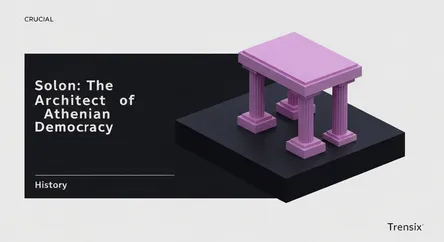History
Solon: The Architect of Athenian Democracy

Discover Solon, the Athenian statesman whose groundbreaking legal and economic reforms laid the essential foundations for democracy in ancient Greece.
What is it?
Solon (c. 630 – c. 560 BC) was a highly respected Athenian statesman, lawmaker, and poet. He is remembered as one of the Seven Sages of Greece and is credited with laying the groundwork for Athenian democracy. Faced with a society on the brink of civil war due to severe economic inequality and aristocratic control, Solon was granted special authority as archon around 594 BC to enact widespread reforms. He introduced a new, more humane law code, replacing the harsh Draconian laws, and restructured the city's social and political framework.
Why is it trending?
Solon's legacy is a cornerstone of Western political thought, making him a perennial figure of study. His attempts to create a more just society through legal and economic moderation resonate with modern debates on debt relief, social inequality, and political representation. His most famous reform, the "Seisachtheia" or "shaking off of burdens," cancelled all debts and abolished debt slavery, a radical move that prevented a civil uprising. He also restructured citizenship into four classes based on wealth rather than birth, allowing for broader participation in government. These foundational steps toward a more inclusive government are why he is seen as a pivotal figure in the evolution of democracy.
How does it affect people?
For the people of Athens, Solon's reforms were transformative. He freed citizens who had been forced into slavery over debt and returned their confiscated lands. By forbidding loans secured on a person's liberty, he provided crucial economic security for the lower classes. Politically, his creation of a new council and allowing all citizens to participate in the assembly and law courts gave them unprecedented power and a voice in their governance. These changes reduced the power of the aristocracy, stimulated the economy by encouraging trade, and fostered a new sense of civic responsibility among the populace.